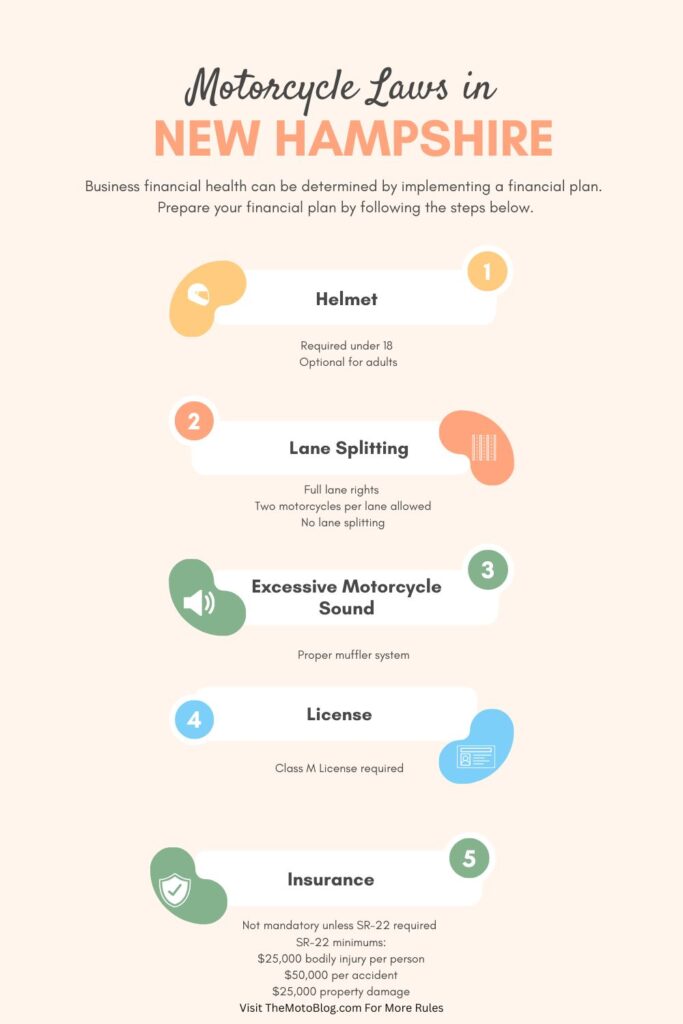Motorcycle Laws in New Hampshire: A Comprehensive Guide for Riders
Whether you’re cruising through the White Mountains or exploring the scenic Kancamagus Highway, understanding motorcycle laws in New Hampshire is essential for a safe and legal ride. As one of the few states without a universal helmet law, New Hampshire offers unique freedoms while maintaining strict safety standards. Bordering states like Maine, Vermont, and Massachusetts have different regulations, making it crucial for riders to understand the legal landscape when crossing state lines.

| Requirement | Rule |
|---|---|
| Minimum Age | 16 years old |
| Youth Riding (12-14) | Must be accompanied by licensed motorcyclist 18+ |
| License Type | Class M License required |
| Permit Duration | 45 days |
| Permit Restrictions | – No passengers – Sunrise to sunset only – One renewal allowed |
| Helmet Law | – Required under 18 – Optional for adults |
| Eye Protection | Required unless motorcycle has windscreen |
| Lane Usage | – Full lane rights – Two motorcycles per lane allowed – No lane splitting |
| Handlebar Height | Must not be above shoulders |
| Required Equipment | – Left side mirror – Turn signals (post-1973 models) – Mufflers – Headlights/taillights for night riding |
| Insurance | – Not mandatory unless SR-22 required – SR-22 minimums: • $25,000 bodily injury per person • $50,000 per accident • $25,000 property damage |
| Registration | – Two-step process: • Town clerk verification • DMV registration – Renewal within 4 months of expiration |
| Noise Limits | Maximum 106dBA at 20 inches from exhaust |
| Group Riding | – Maximum 2 motorcycles abreast – No riding between lanes |
| Skills Testing | Must take training class after 2 failed attempts |
| Documentation Needed | – DSMV 450 form – Current driver’s license – $30 fee |
Licensing Requirements
Getting Your Class M License
To legally operate a motorcycle in New Hampshire, riders must obtain a Class M license. The process involves meeting specific requirements and demonstrating competency through testing and documentation.
Age and Experience Requirements
The minimum age for motorcycle operation is 16 years old. Younger riders between 12-14 must be accompanied by a licensed motorcyclist who is at least 18 years old.
Testing and Education
Prospective riders must complete either:
- Basic Rider Class
- DMV motorcycle skills test
- Vision test
- Motorcycle knowledge test
Required Documentation
Applicants need to provide:
- Completed Application for Driver License (DSMV 450)
- Current Driver License
- $30 fee payment
Instructional Permits
New riders receive a permit valid for:
- 45-day duration
- No passenger privileges
- Daytime riding only
- One renewal opportunity
Safety Equipment Requirements
Helmet Laws
New Hampshire maintains a unique position on helmet laws:
- No universal helmet requirement for adults
- Mandatory for riders under 18
Required Safety Equipment
All motorcycles must have:
- Left side rearview mirror
- Turn signals (for post-1973 models)
- Functioning mufflers
- Eye protection unless equipped with windscreen
Operating Regulations
Lane Usage Rules
Riders must follow specific lane usage guidelines:
- Full lane use rights
- Two motorcycles permitted side-by-side
- No lane sharing with other vehicles
- Lane splitting prohibited
Equipment Operations
- Headlights and taillights required after sunset
- Daytime modulating headlights permitted
- Handlebars must not exceed shoulder height
Insurance Requirements
While New Hampshire doesn’t mandate motorcycle insurance, SR-22 cases require:
- $25,000 bodily injury per person
- $50,000 bodily injury per accident
- $25,000 property damage
- $1,000 medical payments
- $25,000/$50,000 uninsured/under-insured motorist coverage
Registration Process
The two-step registration process involves:
- Town clerk verification
- DMV registration completion
Registration must be renewed within four months of expiration.
Group Riding and Traffic Rules
Specific regulations govern group riding:
- Maximum two motorcycles side-by-side
- Lane splitting prohibited
- Must maintain safe following distance
Enforcement and Penalties
Skills test failures require additional training:
- After two unsuccessful attempts, riders must complete a motorcycle training class
New Hampshire’s motorcycle laws reflect the state’s “Live Free or Die” motto while maintaining necessary safety standards. When planning rides across New England, remember that neighboring states like Vermont and Massachusetts have stricter helmet laws and insurance requirements. Whether you’re a resident or just passing through, staying informed about these regulations ensures a smooth riding experience through the Granite State’s beautiful landscapes. The contrast between New Hampshire’s relatively lenient approach and the more stringent requirements of surrounding states makes it essential to stay updated on regional variations in motorcycle laws.
Motorcycle Laws in the US By States
If you liked this article, then please subscribe to our YouTube Channel for more Bike Videos. You can also find us on Instagram, Twitter and Facebook.
Disclosure: As an Amazon Associate, I earn from qualifying purchases. Read more about Amazon Affiliate Disclaimer.

Vishwanath Mathpati
I am Vishwanath Mathpati, a full-time Blogger and Motorcyclist from Bidar, Karnataka. I love writing about my Motorcycles Stories and Riding Gears on this blog.
Know More About Me.







